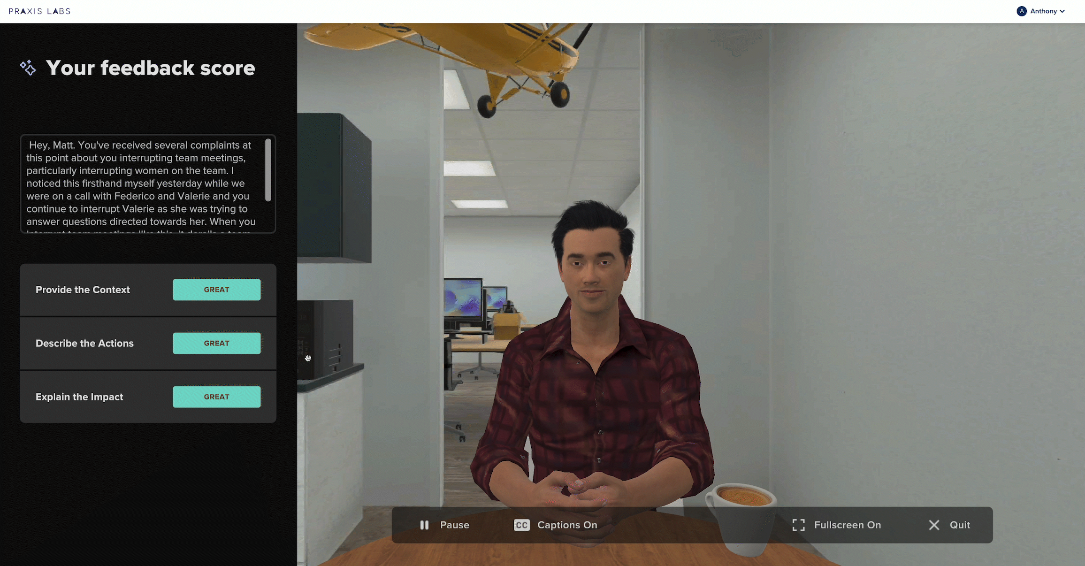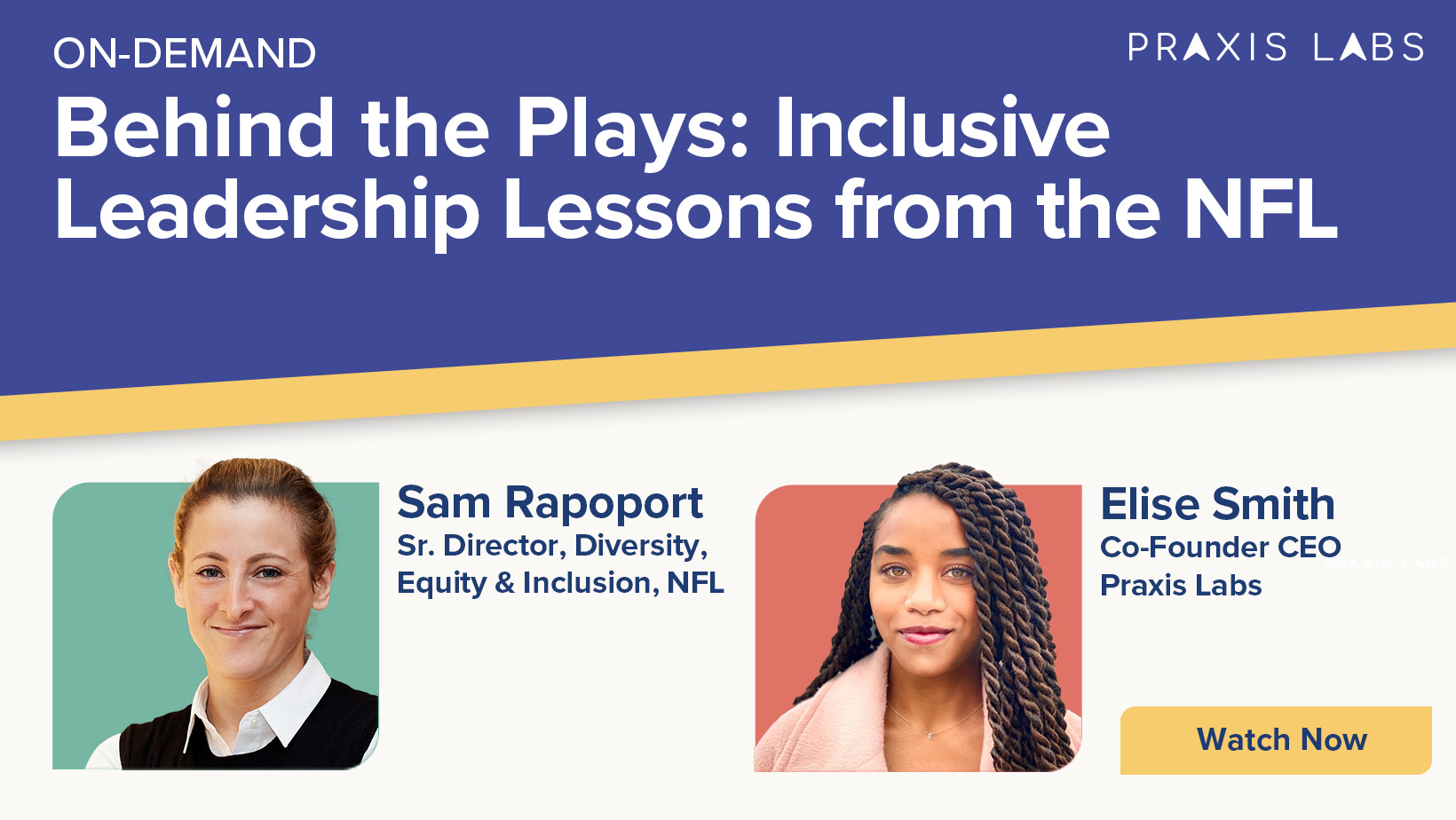The call for effective, inclusive leadership has never been louder. A staggering 42% of managers believe their organizations fail to support their leadership development. On top of that, 89% of HR leaders stress the critical need to lead with empathy in today’s increasingly hybrid and flexible work environments.
The challenge many L&D and HR leaders face is that traditional training methods fail to meet the moment to deliver engaging and impactful learning experiences.
Enter Pivotal Practice, a stress-free environment to learn, practice, and build critical human skills needed to create a more inclusive workplace. By leveraging GenAI, learning science, and roleplay simulation, Pivotal Practice is poised to redefine leadership, transforming managers into confident, effective, and inclusive leaders.
Personalized feedback, powered by the best of technology and human psychology
Pivotal Practice sets a new standard in leadership training, pioneering a blend of GenAI with in-depth research and insights from Praxis Labs’ in-house team of learning scientists and psychologists. This unique approach offers highly personalized feedback aimed at boosting inclusive leadership skills. These skills are proven to drive team performance and organizational outcomes.
Central to Pivotal Practice’s methodology is its immersive training experiences that foster accelerated skills growth through real-world application. By engaging learners in scenarios that mirror actual workplace challenges, they promote the practical application of core leadership skills such as empathy, decision-making, and self-awareness.
This hands-on approach is enhanced by GenAI-driven personalized recommendations, allowing for a tailored learning experience that prioritizes rapid skill enhancement and application. Learners receive direct and real-time feedback on the actions taken in the immersive experience, giving them clear insights on how to improve in the future.
Built for scalable use in the flow of work
Traditional hour-long courses and winding learning paths no longer cut it for today’s busy managers. Between juggling various work priorities and team management, they rarely have time to focus on learning.
Pivotal Practice was designed with the perennially pressed-for-time manager in mind. The product offers on-demand, bite-sized learning experiences that can be finished in 5-7 minutes. The experiences focus on highly relevant and realistic scenarios where managers de-escalate conflict, provide constructive feedback, set clear performance expectations, and more — critical skills that can be immediately applied in real-world contexts like team meetings and one-on-one conversations.
“The new experiences and skills within Pivotal Practice will help enable the leaders of today and tomorrow to tap into personalized and deeply impactful training that will push the boundaries on both inclusivity and business outcomes,” says Praxis Labs Co-founder & CEO, Elise Smith.
This approach not only makes learning accessible and engaging, but also deeply practical. By aligning learning experiences closely with everyday managerial responsibilities, Pivotal Practice ensures that leadership development is easily integrated into the flow of work, offering a direct and accessible pathway to improve inclusion and effectiveness without disrupting the daily grind.
Measuring Impact
Pivotal Practice places a strong emphasis on comprehensive measurement embedded directly within its simulations, leveraging GenAI-driven assessments to track a learner’s progress. This innovative approach enables the platform to monitor skill growth from the very start of the learning journey, through the pivotal moments of learning within the simulations, and extending to the crucial phase of applying these newly acquired skills in real-life contexts. This seamless integration of assessment and learning ensures that measurement is an ongoing process, providing continuous insights into skill development.
By offering a clear, data-driven view of skill progression, learners are empowered to recognize their own strengths and areas for improvement. This comprehensive assessment and feedback loop makes it possible for learners to see real growth and make meaningful changes in their approach to leadership.
Beyond individual learner growth, Pivotal Practice provides deep, actionable insights to HR and L&D leaders, enabling them to gauge tangible skill improvements across their organization. This data-driven perspective not only highlights the overall effectiveness of the training but also equips organizational leaders with the knowledge they need to foster a truly inclusive and high-performing culture.
Built with your data security top of mind
In today’s digital age, data security is a non-negotiable. That’s why Pivotal Practice is fully compliant with SOC2 security standards. Our commitment to comprehensive data protection ensures that every interaction with our platform is secure, providing managers a safe space to focus on their growth and development, while leadership can be free of concerns about data privacy and protection.
Leading a deeply human future
At a time when GenAI is surrounded by fears of dampening our creativity, critical thinking, and capacity for connection, Pivotal Practice demonstrates how the latest advancements in technology can be used to deepen our ability to connect with and lead across diverse workforces.
As our Co-founder and Chief Product Officer, Heather Shen, puts it: “By leveraging Praxis Labs’ technology to deepen humanity in the workplace, we can unlock the unlimited potential for collaboration, innovation, and, ultimately, organizational success.”

